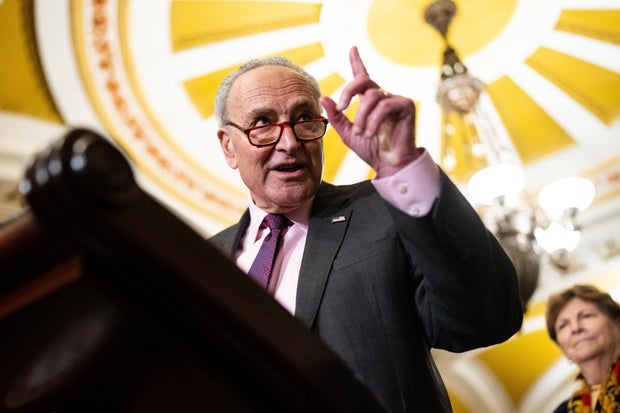Washington — Senate Majority Leader Chuck Schumer said a national security bill that includes tens of billions of dollars in foreign aid and a long-sought agreement to bolster border security could be unveiled as early as Friday and no later than Sunday, setting the stage for potential votes on the package next week.
“Conversations are ongoing, some issues still need resolution, but we are getting very close on the national security supplemental,” Schumer said on the Senate floor Thursday. “We plan to post the full text of the national security supplemental as early as tomorrow, no later than Sunday.”
Schumer noted that the upper chamber will be in session on Monday, one day earlier than it was previously scheduled to return. The first vote on the supplemental is expected no later than Wednesday.
Sens. Chris Murphy, James Lankford and Kyrsten Sinema have for months been working to reach a framework on a border agreement designed to reduce illegal crossings along the southern border after unprecedented levels of migration. Republicans insisted on tying the deal to the supplemental spending package requested by President Biden, which has been in limbo as the immigration talks progressed. The broader package includes billions of dollars for Ukraine, Israel, Taiwan and other national security priorities.
Despite progress in recent weeks toward reaching a deal, emerging Republican opposition to the immigration provisions threatened to derail the effort before the text was even finalized. Former President Donald Trump fueled those doubts when he made clear that he opposed the still-unreleased agreement.
Though the deal’s release appears imminent, negotiators said the funding process was still being ironed out. Murphy, a Connecticut Democrat who has led the border negotiations for his party, said earlier Thursday that he is “getting worried” about GOP seriousness about paying for the immigration agreement.
“I’m increasingly worried that Republicans aren’t committed to funding the deal on the appropriation side as a way to potentially undermine it,” he said.
The Connecticut Democrats said it’s “taking a maddeningly long time” to wrap the appropriations side of the deal, as he noted that “it’s time for us to move on this.”
Despite the push from Republicans to tie border security to other issues in the national security supplemental, like aid to Ukraine, Senate Minority Leader Mitch McConnell on Wednesday suggested that the border issue could be decoupled from the rest of the package, saying the chamber needs to move forward on aid to Ukraine and Israel.
When asked about the possibility of moving forward with the supplemental without the border security agreement, Murphy said it would be “ridiculous” for Republicans to walk away from the border components without voting on the issue.
“It’s wild to me that after working for four months to get a breakthrough deal to fix the border, Republicans are talking about walking away from it just because Donald Trump doesn’t like it,” he added.
Sen. Kevin Cramer, a North Dakota Republican, added to the doubts among GOP lawmakers on Thursday, telling reporters that support for the deal is “going the wrong direction for passage.”
“Certainly in the House it’s losing support,” he said. “I think in the Senate, it’s getting harder for Republicans. The path to a majority of the Republicans is getting narrower.”
The deal’s prospects grew dimmer in recent days when Speaker Mike Johnson said the agreement is “dead on arrival” in the lower chamber. But negotiators have insisted that Republicans will change their tune when they read the text of the deal.
And despite Murphy’s concern, he noted that he remains “an optimist.”
“I hope that we can get there and get this bill on the floor very quickly, but I’m growing a little worried,” he said.
Alan He and Ellis Kim contributed reporting.

